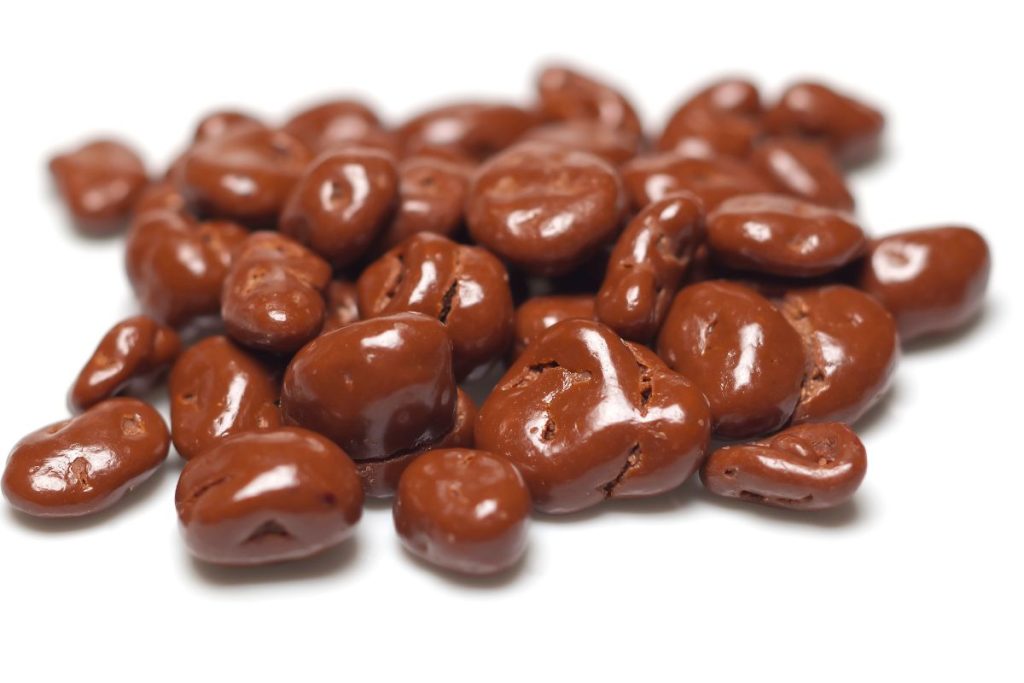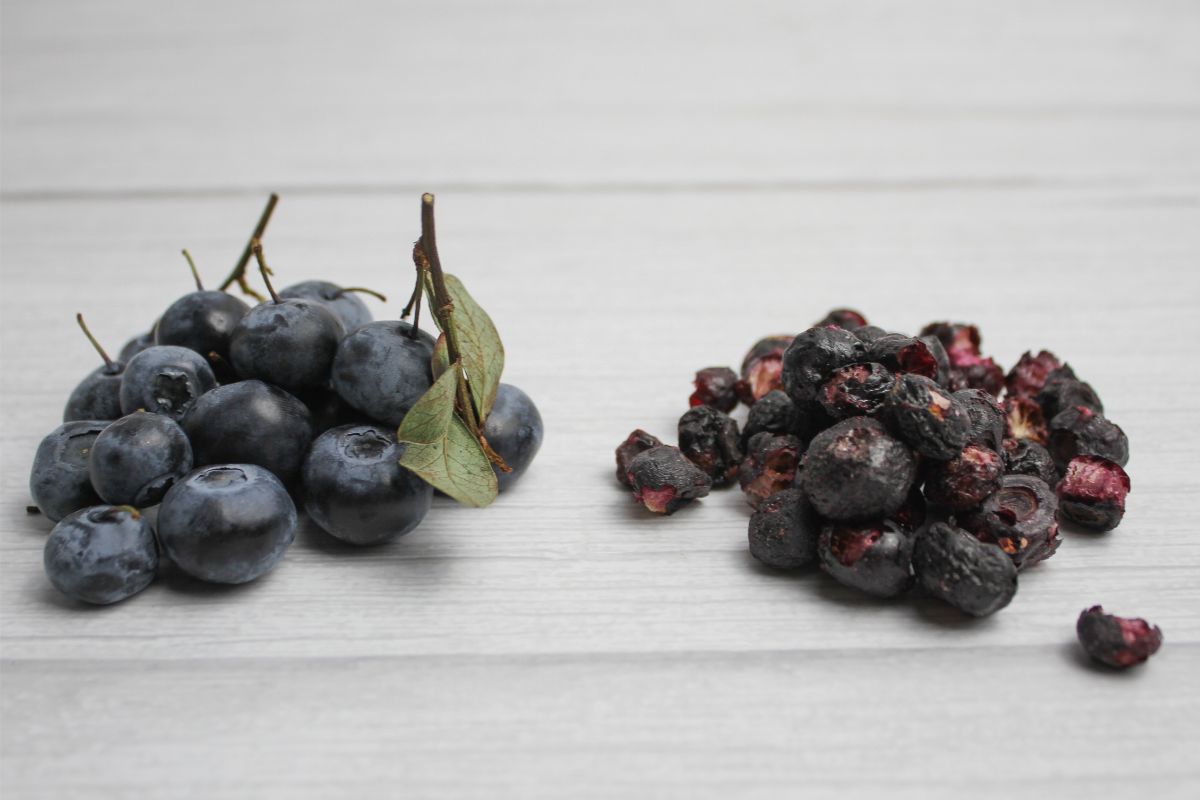To make freeze-dried blueberries in a freeze dryer, wash and dry the blueberries. Prick each blueberry with a toothpick, and load them onto trays. Place the trays in the freeze-drying machine and press the Freeze-dry setting. The berries will take between 24-36 hours to freeze-dry.
Table of Contents
How to Make Freeze-Dried Blueberries
Freeze-drying is a method of preserving food that involves removing nearly all of the moisture from it, which gives freeze-dried blueberries a longer shelf life than dried blueberries.
To make freeze-dried blueberries in a freeze-drying machine, follow these steps:
- Wash the blueberries thoroughly under running water and then dry them with a clean kitchen cloth.
- Cut the berries in half or prick them with a toothpick to break the skin for faster freeze-drying.
- Pre-freeze the blueberries by placing them in a freezer undisturbed for 24 hours or until the blueberries are solidly frozen. Keep the freezer door closed throughout the pre-freezing process to avoid interrupting the freezing cycle and resulting in undesirable crystals forming in the berries.
- Cover the freeze-drying trays with parchment paper.
- Load the frozen blueberries onto the freeze-dryer trays in a single layer. Load the tray into the freeze-drying machine.
- Press the “Frozen” button, and follow the directions on the screen.
- Close the chamber to start the freeze-drying process.
- Check the blueberries once the freeze-drying process is complete. Fully freeze-dried berries crumble easily and have a light and airy texture.
- Select the option to “warm trays” to bring the freeze-dried berries to room temperature. Do not store cold blueberries immediately, as they can attract moisture from the atmosphere.
- Store your freeze-dried blueberries in a resealable bag in a cool, dry place for up to 2 years.

Are Dried Blueberries Healthy?
Yes, dried blueberries are nutritious and a worthy addition to your diet. Some of the health benefits of eating dried blueberries include:
- Organic dried blueberries are a healthy snack with no added preservatives.
- Blueberries are high in antioxidants which shield cells from free radical damage.
- Freeze-dried blueberries are a good source of dietary fiber.
- Some studies suggest that blueberries contain compounds called flavonoids that help improve cognitive function, including memory and learning.
- Blueberries contain anti-inflammatory properties that may help reduce chronic inflammation.
- Freeze-dried blueberries contain important nutrients, including vitamin A, vitamin C, vitamin K, potassium, calcium, iron, and manganese.
- Dried blueberries are gluten-free, vegan, kosher, and non-GMO, which makes them perfect for those following these diets.
How to Sweeten Dried Blueberries
Unsweetened dried fruit has natural sweetness, but here are some ideas to sweeten dried blueberries:
- Soak dried blueberries in apple juice for a few minutes. Drain the excess liquid before serving.
- Sweeten the blueberries by tossing them in a thin layer of honey or maple syrup. These two natural sweeteners help enhance the flavor of the blueberries.
- Dip them in creamy, dark chocolate for a delicious snack or dessert.
- Use coconut sugar in place of table sugar to coat the blueberries. Mix the fruits in a bowl with a 1/2 teaspoon of water and a few teaspoons of coconut sugar to coat them right before eating them.
- Sprinkle a small amount of stevia over the blueberries, a zero-calorie natural sweetener.
- Mix dried blueberries with other sweetened dried fruits such as dried cherries, Craisins, or dried raspberries, or mix them with tree nuts such as glazed pecans or honey-roasted cashews in a custom trail mix.

What is the Difference Between Homemade Dried Blueberries and Store Bought?
Homemade dried blueberries and store-bought dried blueberries differ in the following ways:
- Additives: Whole dried blueberries from store brands such as Ocean Spray and Kirkland Signature contain additives such as sweeteners, citric acid, malic acid, and juice concentrates that affect their taste, texture, and nutritional value. Homemade dried blueberries only contain what you add to them.
- Quality: Homemade dried blueberries are made with fresh, high-quality blueberries, resulting in a better taste and texture than store-bought ones, which may or may not contain vine-ripened blueberries.
- Cost: Homemade dried blueberries are cost-effective compared to store-bought ones, especially if you have access to blueberries in your home garden.
How to Rehydrate Dried Blueberries
If you wish to add blueberries to baked goods such as blueberry muffins, homemade granola bars, or blueberry bread, you should rehydrate them first to get the best flavor and texture.
To rehydrate dried blueberries:
- Place your dried blueberries in a large bowl or pot.
- Add hot water to the bowl of blueberries, submerging them completely.
- Place a lid over the container to seal in the heat.
- Soak the blueberries in the water for 10-15 minutes or until they are soft and plump.
- Using a fine-mesh strainer, drain the excess water from the blueberries.
- Use the rehydrated blueberries in your favorite recipes!

What is the Difference Between Freeze-Dried and Dried Blueberries?
The key difference between freeze-dried and dried blueberries is their moisture content, and this affects how long they can be stored. Freeze-dried berries have 99% of the moisture removed from the fruit, while dehydrated or dried blueberries retain 5-7% of their original water content.
Dried blueberries have a shorter shelf life because of the higher moisture content and should be consumed in 6 months.
How to Store Freeze-Dried and Dried Blueberries
Both freeze-dried blueberries and dried blueberries may be stored at room temperature in a cool, dry, dark place or kept in a freezer in airtight containers.
Freeze-dried blueberries benefit from being stored in vacuum-seal or Mylar bags with an oxygen absorber. This helps ensure a low-oxygen environment, allowing storage for many years.
Dried blueberries may also be stored in vacuum-seal bags or Mylar bags but may also be stored in canning jars such as Mason jars.
Shelf Life of Dried and Freeze-Dried Blueberries
The shelf life of dried and freeze-dried fruit is determined by the type of packaging used and the storage conditions. Properly stored dried blueberries packed in an airtight container can last up to 6 months at room temperature or 12 months if stored in a freezer.
Freeze-dried wild blueberries last longer than dried blueberries, thanks to the removal of 99% of their moisture content during the freeze-drying process. If stored properly in sealed containers, freeze-dried berries can last for several years at room temperature or up to 15 years if stored in a freezer.
Do Dried Blueberries Spoil?
Yes, dried blueberries spoil if they are not stored in airtight containers or are past their expiration date. They are more prone to spoilage if exposed to moisture, air, or direct light.
Make sure to check dried blueberries for signs of spoilage regularly. If you notice any visible evidence of mold, discoloration, or off-odors, discard them immediately.

